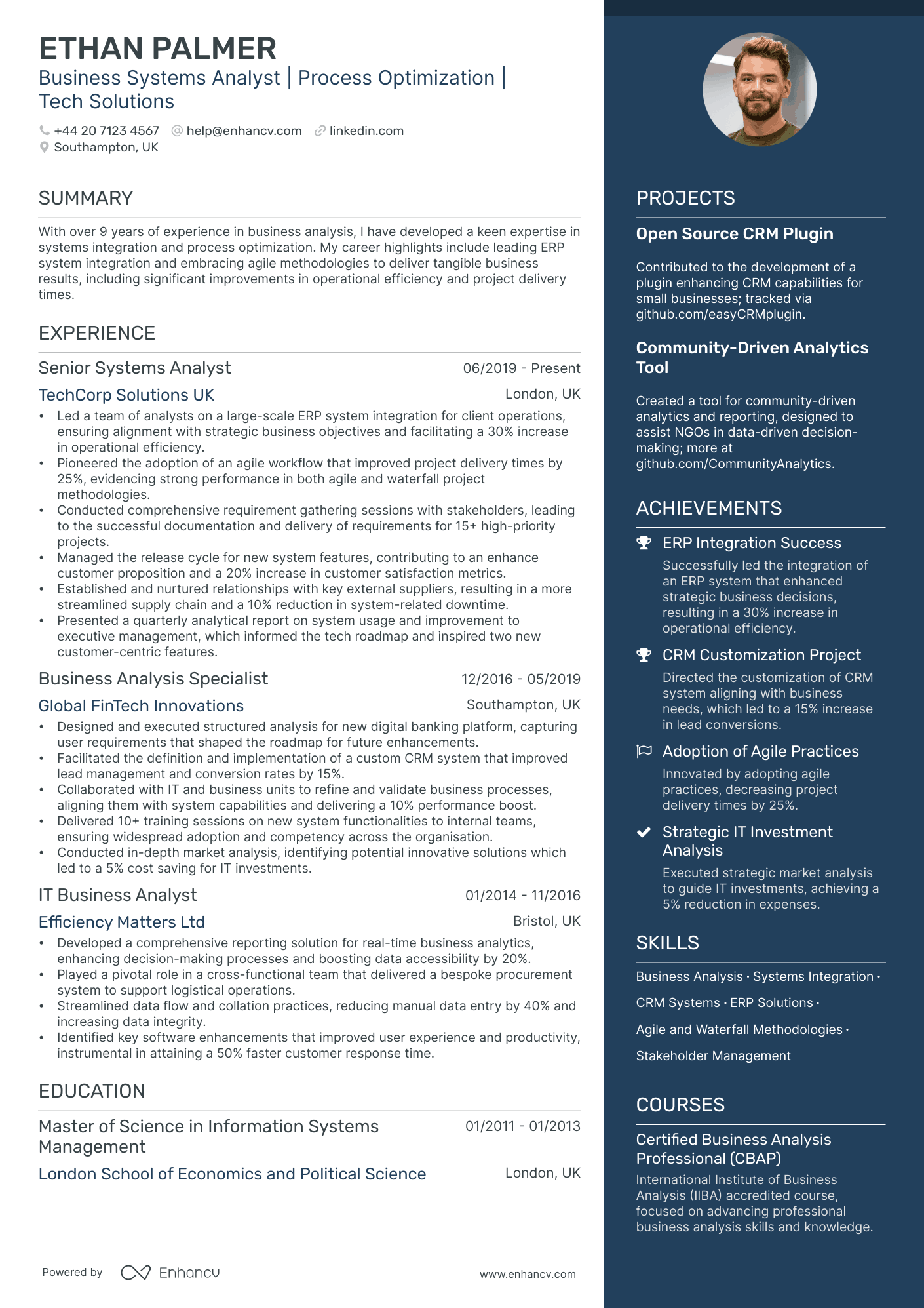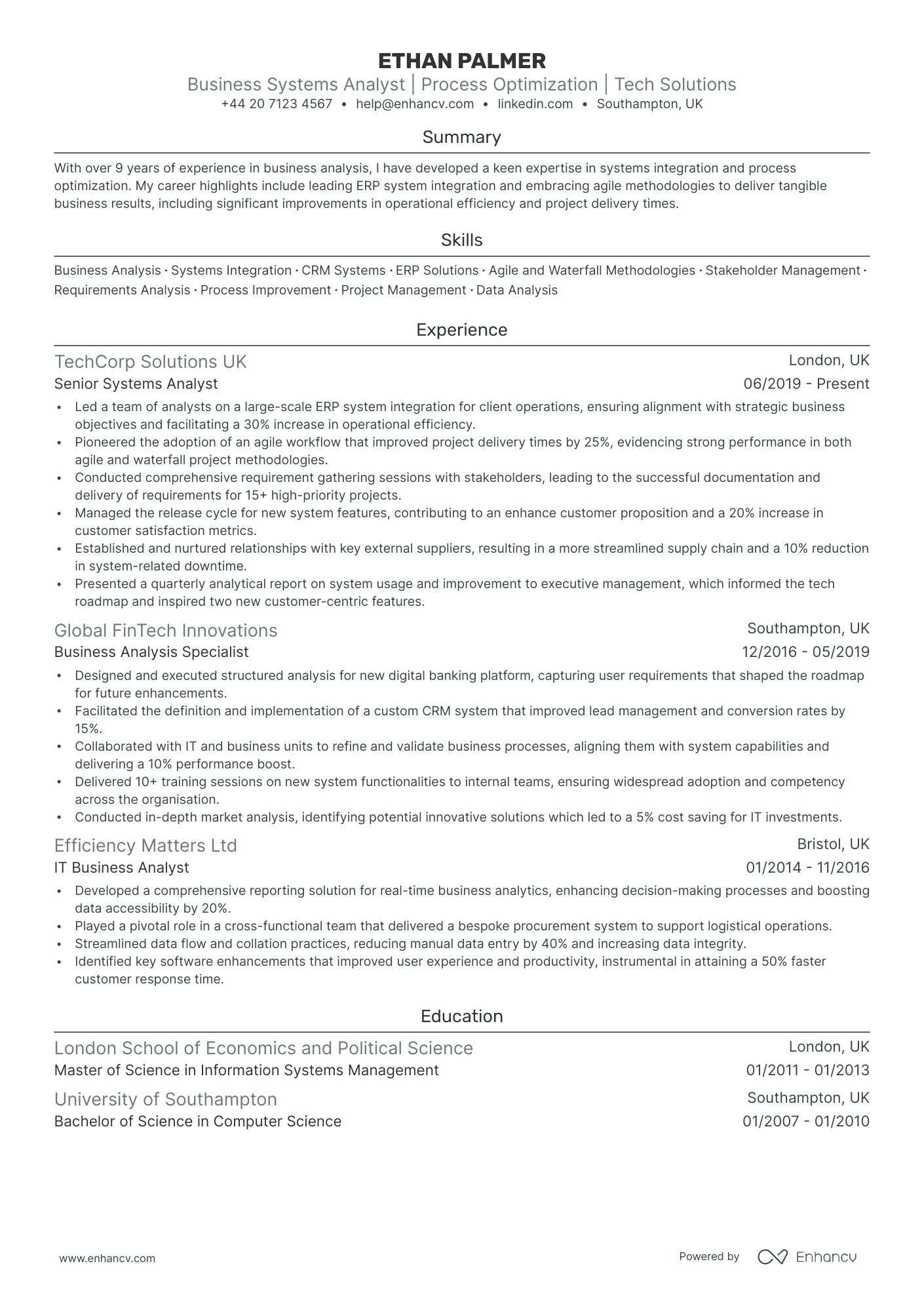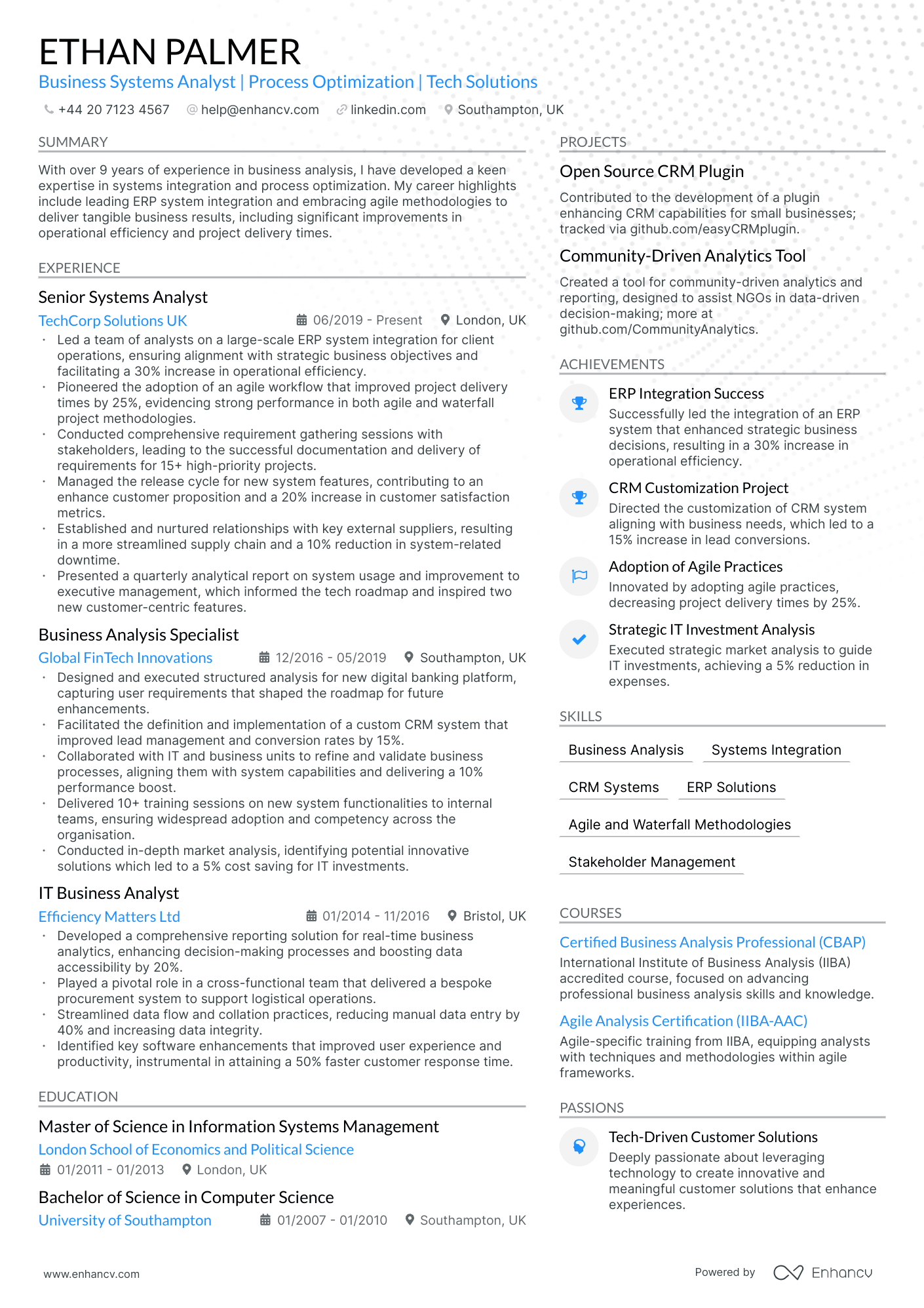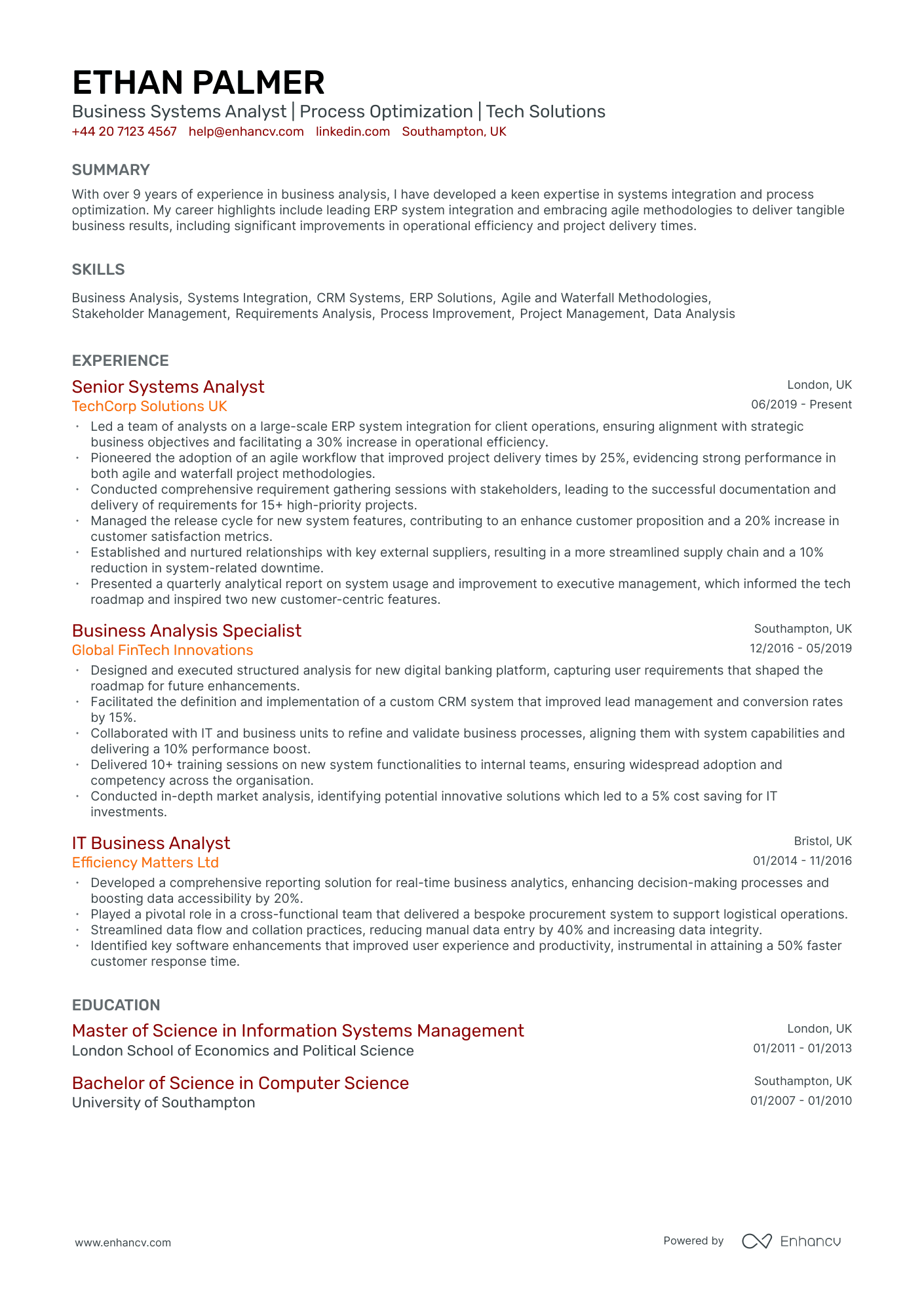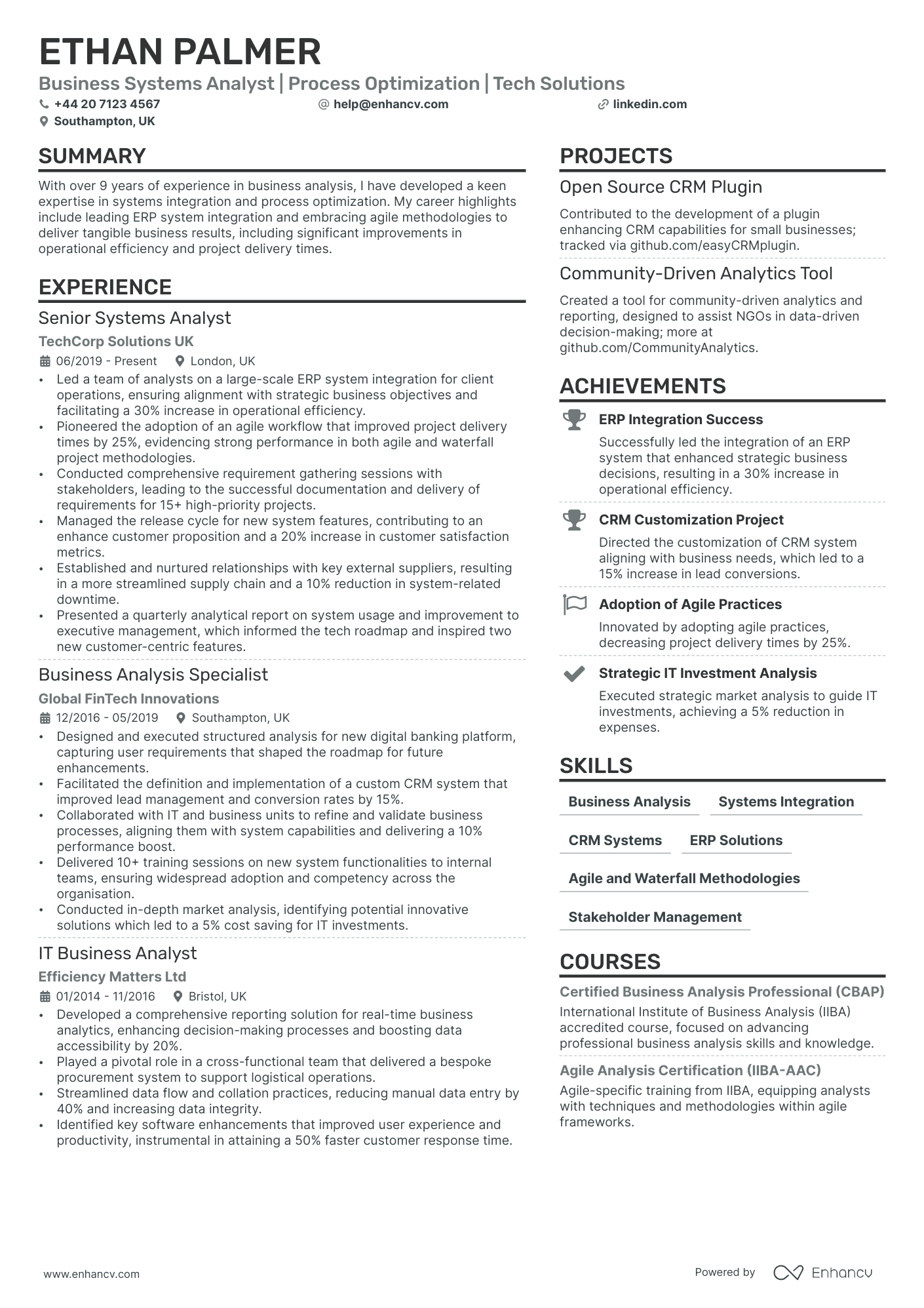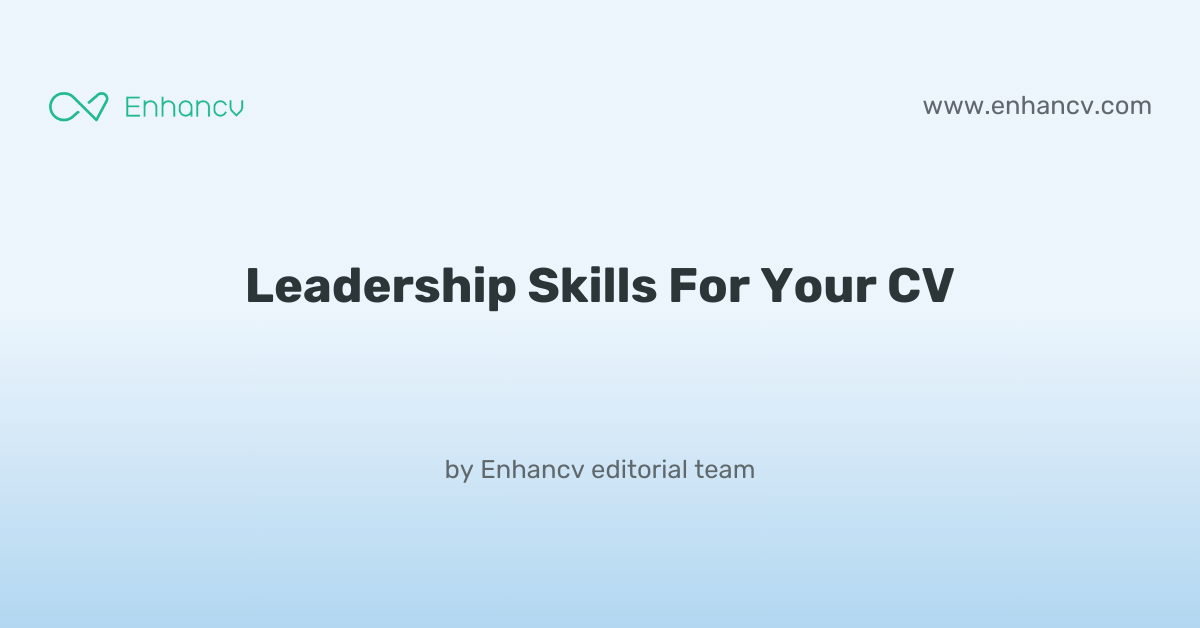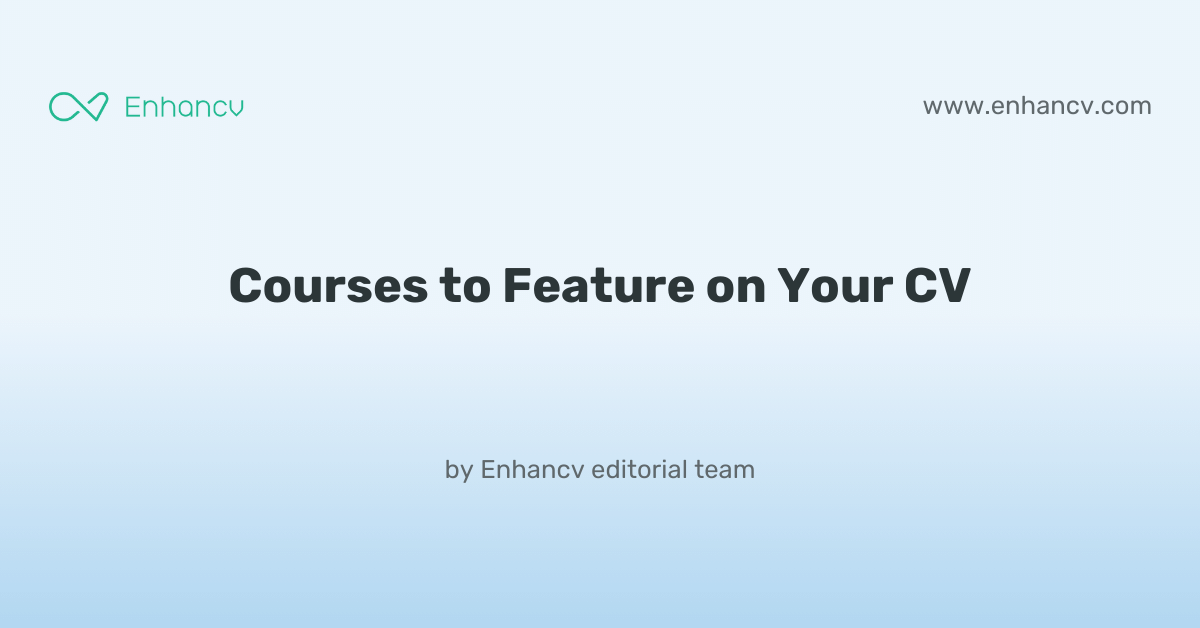Crafting a CV that effectively encapsulates your diverse skill set and project experience can be a daunting challenge for any system analyst. By utilising our guide, you'll gain insights into tailoring your CV to highlight your analytical prowess and problem-solving capabilities, ensuring you stand out in the competitive job market.
- Applying best practices from real-world examples to ensure your profile always meets recruiters' expectations;
- What to include in your work experience section, apart from your past roles and responsibilities?
- Why are both hard and soft skills important for your application?
- How do you need to format your CV to pass the Applicant Tracker Software (ATS) assessment?
If you're writing your CV for a niche system analyst role, make sure to get some inspiration from professionals:
How complex should the format of your system analyst CV be?
Perhaps, you decided to use a fancy font and plenty of colours to ensure your system analyst CV stands out amongst the pile of other candidate profiles. Alas - this may confuse recruiters. By keeping your format simple and organising your information coherently, you'll ultimately make a better impression. What matters most is your experience, while your CV format should act as complementary thing by:- Presenting the information in a reverse chronological order with the most recent of your jobs first. This is done so that your career history stays organised and is aligned to the role;
- Making it easy for recruiters to get in touch with you by including your contact details in the CV header. Regarding the design of your CV header, include plenty of white space and icons to draw attention to your information. If you're applying for roles in the UK, don't include a photo, as this is considered a bad practice;
- Organising your most important CV sections with consistent colours, plenty of white space, and appropriate margins (2.54 cm). Remember that your CV design should always aim at legibility and to spotlight your key information;
- Writing no more than two pages of your relevant experience. For candidates who are just starting out in the field, we recommend to have an one-page CV.
One more thing about your CV format - you may be worried if your double column CV is Applicant Tracker System (ATS) complaint. In our recent study, we discovered that both single and double-column CVs are ATS-friendly . Most ATSes out there can also read all serif and sans serif fonts. We suggest you go with modern, yet simple, fonts (e.g. Rubik, Lato, Raleway) instead of the classic Times New Roman. You'll want your application to stand out, and many candidates still go for the classics. Finally, you'll have to export your CV. If you're wondering if you should select Doc or PDF, we always advise going with PDF. Your CV in PDF will stay intact and opens easily on every OS, including Mac OS.
PRO TIP
Use font size and style strategically to create a visual hierarchy, drawing the reader's eye to the most important information first (like your name and most recent job title).
The top sections on a system analyst CV
- Professional Summary showcases the candidate's value proposition.
- Core Competencies highlight relevant skills for system analysis.
- Work Experience demonstrates real-world application of expertise.
- Education and Certifications indicate formal training and qualifications.
- Technical Proficiencies detail specific systems and tools proficiency.
What recruiters value on your CV:
- Highlight your analytical skills by showcasing how you've successfully evaluated systems, interpreted data, and provided actionable insights in previous roles.
- Emphasise your technical proficiency by detailing your experience with specific programming languages, databases, and systems analysis tools that are relevant to the role.
- Include specific examples of how you effectively communicated complex technical information to non-technical stakeholders, demonstrating your ability to bridge the gap between IT and business functions.
- Illustrate your problem-solving abilities with examples of complex system issues you've resolved and the methodologies you employed, such as root cause analysis or cost-benefit analysis.
- Showcase your project management experience by outlining your role in overseeing system implementation or improvement projects, including methodologies used like Agile or Waterfall.
Recommended reads:
Making a good first impression with your system analyst CV header
Your typical CV header consists of Your typical CV header consists of contact details and a headline. Make sure to list your professional phone number, email address, and a link to your professional portfolio (or, alternatively, your LinkedIn profile). When writing your CV headline , ensure it's:
- tailored to the job you're applying for;
- highlights your unique value as a professional;
- concise, yet matches relevant job ad keywords.
You can, for examples, list your current job title or a particular skill as part of your headline. Now, if you decide on including your photo in your CV header, ensure it's a professional one, rather than one from your graduation or night out. You may happen to have plenty more questions on how to make best the use of your CV headline. We'll help you with some real-world examples, below.
Examples of good CV headlines for system analyst:
- Lead System Analyst | IT Infrastructure & Business Process Optimisation | Prince2 Certified | 10+ Years Experience
- Junior System Analyst | Data Modelling & Software Development Lifecycle | BCS Diploma | Agile Enthusiast
- System Analysis Specialist | CRM & ERP Solutions Expert | Six Sigma Green Belt | 5 Years' Insight
- Senior System Analyst | Cybersecurity Focus | Cloud Technologies | CISSP | 15 Years of Industry Leadership
- System Analyst Professional | Business Intelligence & Analytics | MSc Information Systems | 8 Years Progressive Experience
- Principal System Analyst | Strategic IT Planning & Implementation | TOGAF Certified | 12+ Years Expertise
Catching recruiters' attention with your system analyst CV summary or objective
Located closer to the top of your CV, both the summary and objective are no more than five sentences long and serve as an introduction to your experience. What is more, you could use either to entice recruiters to read on. Select the:
- Summary, if you happen to have plenty of relevant experience. Feature your most impressive accomplishments and up to three skills that are relevant to the job you're applying for;
- Objective, if you're just starting your career off. Provide your career goals and answer how you see the role you are applying for will match your professional growth.
Judging which one you need to add to your system analyst CV may at times seem difficult. That’s why you need to check out how professionals, with similar to your experience, have written their summary or objective, in the examples below:
CV summaries for a system analyst job:
- With over 8 years of dedicated system analysis experience in the healthcare technology sector, I have honed a robust skill set in requirements gathering, process modeling, and Agile methodologies. I take pride in my role in the successful deployment of an electronic health record system that improved patient outcomes by 30%.
- Bringing a rich 10-year background in financial technology, my analytical abilities have been instrumental in streamlining banking software systems, resulting in a 25% reduction in processing times. Expertise in SQL, Python, and data analytics tools underpin my track record of delivering data-driven solutions that exceed business objectives.
- Eager to transfer my 5-year expertise in project management and business consultancy to system analysis, I am adept at identifying operational inefficiencies and crafting technological solutions. My strategic vision was reflected in a CRM integration project that accelerated sales cycles by 15% for a SaaS provider.
- Transitioning from a cybersecurity background, my insights into data protection and risk management will enrich my system analyst endeavors. During my 6-year tenure as a network security specialist, I implemented a company-wide encryption protocol that slashed data breaches by 40%.
- Keen to embark on a career in system analysis, my fresh perspective is backed by a recent first-class honours degree in Computer Science. I am eager to apply my academic prowess, which includes a final-year project that developed an inventory management algorithm lauded for its originality and practical application.
- As a new entrant to system analysis with a passion for technology and optimization, my objective is to leverage my Master's in Information Technology and internship experience with a leading software house to contribute to resourceful system design and innovative problem-solving.
More detailed look into your work history: best advice on writing your system analyst CV experience section
The CV experience is a space not just to merely list your past roles and responsibilities. It is the CV real estate within which you could detail your greatest accomplishments and skills, while matching the job requirements. Here's what to have in your experience section:
- Prove you have what the job wants with your unique skill set and past successes;
- Start each bullet with a strong, action verb, and continue with the outcome of your responsibility;
- Use any awards, nominations, and recognitions you've received as solid proof of your skill set and expertise;
- align your experience with the role responsibilities and duties.
For more help on how to write your CV experience section, check out the next section of our guide:
Best practices for your CV's work experience section
- Utilised analytical skills to evaluate business requirements and translated them into detailed system specifications, ensuring full integration with existing systems.
- Successfully coordinated with cross-functional teams to deliver 5+ complex system integration projects on time and within budget, resulting in a 20% efficiency increase.
- Implemented robust testing protocols to identify and rectify system issues pre-deployment, leading to a reduction in post-launch bugs by 30%.
- Designed and maintained comprehensive system documentation that served as a reference for IT teams and stakeholders, enhancing system understanding and user training.
- Led workshops and training sessions for users, increasing system adoption and proficiency across the organisation by 40% in the first quarter of implementation.
- Applied project management methodologies, such as Agile or Waterfall, to plan and oversee system development life cycle, consistently hitting all major milestones.
- Performed in-depth data analysis and modelling, contributing to the development of scalable systems that supported the company's growth strategies effectively.
- Actively liaised with vendors to evaluate and procure necessary system components, ensuring compatibility and cost-effectiveness, which saved the company over 15% in IT expenses.
- Championed the use of innovative technologies, such as AI and machine learning, to automate processes and enhance system capabilities, placing the company ahead of competitors.
- Led a team of 5 in developing and implementing a new inventory management system that decreased processing time by 30%.
- Collaborated cross-functionally with the marketing and sales departments to integrate system enhancements that improved customer data analysis, boosting sales lead generation by 20%.
- Managed the successful migration of legacy systems to cloud-based platforms, improving system scalability and availability while reducing operational costs by 17%.
- Designed and implemented a comprehensive disaster recovery plan, ensuring business continuity for critical systems with a 99.8% success rate.
- Optimized system performance by conducting in-depth analytics, resulting in a 25% improvement in response times and increased system uptime.
- Performed regular security audits, identifying and rectifying 15 major security gaps, thus improving system integrity and user trust.
- Developed user training programs for new software platforms, resulting in a 40% increase in productivity due to proficient system use within 3 months of rollout.
- Collaborated with software developers to customize ERP systems to fit unique business processes, enhancing operational efficiency by 22%.
- Conducted root cause analysis on reported system issues, reducing system downtime by 35% and improving end-user satisfaction rates.
- Automated key reporting tasks using SQL and Python scripts, which saved the company 15 hours per week in manual data processing.
- Initiated a company-wide system upgrade that enhanced overall data management capabilities, thereby supporting a 10% yearly growth.
- Coordinated with project management teams to systematically address and resolve over 200 backlogged system requests, improving inter-departmental workflows.
- Played a key role in a project that saw the implementation of a new CRM system, which increased customer retention rates by 15%.
- Analyzed and reconfigured network infrastructure to enhance security posture, reducing potential threats detected by the system by 40%.
- Developed a strategic plan to streamline cross-platform data synchronization, which negated redundant data tasks across departments.
Lacking professional expertise: how to write your CV to highlight your best talents
Don't count on your lucky stars when you're applying for a role, where you happen to have less (or almost none) professional experience. Recruiters sometimes do hire inexperienced candidates if they're able to present their unique value from the get-go. So, instead of opting for the traditional, CV experience section:
- List any applicable expertise you happen to have - no matter if it's a part-time job, internship, or volunteer work. This would hint to recruiters that your profile is relevant;
- Focus your CV on your transferrable skills or talents you've obtained thanks to your whole life and work experience. In effect, you'll be spotlighting your value as a candidate;
- Separate more space for your applicable academic background and certificates to show you have the technical know-how;
- Ensure that within your objective, you've defined why you'll like the job and how you'll be the perfect match for it. Always ensure you've tailored your CV to individual applications.
Looking for more good examples for your first job? We'll show you how other candidates, with less professional experience, have created their job-winning CVs.
Recommended reads:
PRO TIP
Talk about any positive changes you helped bring about in your previous jobs, like improving a process or helping increase efficiency.
Describing your unique skill set using both hard skills and soft skills
Your system analyst CV provides you with the perfect opportunity to spotlight your talents, and at the same time - to pass any form of assessment. Focusing on your skill set across different CV sections is the way to go, as this would provide you with an opportunity to quantify your achievements and successes. There's one common, very simple mistake, which candidates tend to make at this stage. Short on time, they tend to hurry and mess up the spelling of some of the key technologies, skills, and keywords. Copy and paste the particular skill directly from the job requirement to your CV to pass the Applicant Tracker System (ATS) assessment. Now, your CV skills are divided into:
- Technical or hard skills, describing your comfort level with technologies (software and hardware). List your aptitude by curating your certifications, on the work success in the experience section, and technical projects. Use the dedicated skills section to provide recruiters with up to twelve technologies, that match the job requirements, and you're capable of using.
- People or soft skills provide you with an excellent background to communicate, work within a team, solve problems. Don't just copy-paste that you're a "leader" or excel at "analysis". Instead, provide tangible metrics that define your success inusing the particular skill within the strengths, achievements, summary/ objective sections.
Top skills for your system analyst CV:
Systems Analysis
Requirements Engineering
Data Modelling
UML (Unified Modeling Language)
SQL (Structured Query Language)
System Design
Business Process Modeling
ERP (Enterprise Resource Planning) Systems
Technical Documentation
Software Development Lifecycle (SDLC)
Analytical Thinking
Problem Solving
Communication
Attention to Detail
Stakeholder Management
Teamwork
Adaptability
Time Management
Critical Thinking
Project Management
PRO TIP
Order your skills based on the relevance to the role you're applying for, ensuring the most pertinent skills catch the employer's attention first.
CV education and certificates: your academic background as proof of your skill set
A common misconception about your system analyst CV education is that you only need it, if you have less professional experience. That is completely false. The CV education section serves to back up your technical (and sometimes personal) capabilities, fill in gaps in your work history, and show you have the initial industry background and know-how. When creating your education section:
- List your degrees in the reverse chronological order, starting with the most recent (and relevant) ones first;
- Include your degree and university names, start and graduation dates. It's optional to also denote you received a "First-Class Honours" for diplomas that are more relevant to the role;
- Curate your relevant university coursework, projects, or thesis work if you happen to have less professional expertise and need to integrate more job keywords and skills.
Your professional qualifications don't need to stop at your academic background. It's advisable to also select up to three of your most noteworthy (and relevant) industry certificates and feature them in a dedicated section. Once more, include the certificate name, the institution that issued it out, and the date you obtained it on. You could feature both hard skills and soft skills certificates, as in the examples below:
PRO TIP
If there's a noticeable gap in your skillset for the role you're applying for, mention any steps you're taking to acquire these skills, such as online courses or self-study.
Recommended reads:
Key takeaways
Here are five things you need to remember about writing your system analyst CV for success:
- Sort your experience based on the reverse chronological order, starting with your most recent career items, to showcase how you've grown your career;
- Include within your CV header your relevant contact details, a headline that could spotlight your unique value, and a photo - if you're applying for roles outside the UK or US;
- Decide to use the CV summary, if you happen to have more professional experience, and an objective, if you want to showcase your career goals;
- Within the experience section, write your bullets using action verbs, skills, and success, instead of just merely listing your on-the-job responsibilities;
- Prove your technical skills, using your education and certificates, and your soft skills, with your achievements and strengths sections.
